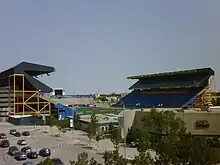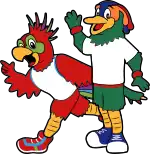1999 Pan American Games
The 1999 Pan American Games, officially the XIII Pan American Games or the 13th Pan American Games, was a major international multi-sport event that was held from July 23 to August 8, 1999, in Winnipeg, Manitoba, Canada and surrounding towns and cities. Canoeing competitions started the day before the games officially begun. Approximately 5,000 athletes from 42 nations participated at the games.[1] A total of 330 medal events in 34 sports and 42 disciplines.[1]
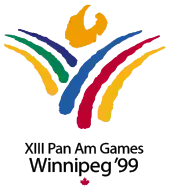 | |
| Host | Winnipeg, Canada |
|---|---|
| Motto | Americas' Fest |
| Nations | 42 |
| Athletes | 5,083 |
| Events | 330 in 34 sports |
| Opening | July 23 |
| Closing | August 8 |
| Opened by | Governor General Roméo LeBlanc |
| Cauldron lighter | Alwyn Morris Silken Laumann |
| Main venue | Winnipeg Stadium |
Financially, the 1999 games were a success, generating a surplus of $8.9 million[2][3] through a combination of fiscal restraint[4] and the contribution of nearly 20,000 volunteers.[5]
The 1999 Pan American Games were the second Pan American Games hosted by Canada and Winnipeg.[2] Previously, Winnipeg hosted the 1967 Pan American Games.[2]
Bidding process

Winnipeg beat both Santo Domingo, Dominican Republic and Bogota, Colombia in 1994 to win hosting rights for the event.[6]
In 1988, a delegation from Winnipeg announced that once it got approval from the Canadian Olympic Association, the city would submit a bid to host the 1999 Pan American Games. On December 5, 1992, Winnipeg secured the Canadian bidding rights, defeating Toronto by one vote. Other Canadian cities in the running were Halifax, Edmonton, and Sherbrooke.[7][8] Toronto would later go on to host the 2015 Pan American Games, 16 years later.[9]
Any country that had previously held the games were allotted two votes; those countries were Argentina, Brazil, Canada, Colombia, Mexico, the United States, and Venezuela, making 50 votes in total, and a city needed majority vote (26) to win.[10]
After the first round of voting, Bogotá was forced to drop out having the fewest votes with 10. In the second round, Winnipeg and Santo Domingo reached a 25-to-25 tie. Canadian Committee Co-Chairman Don Mackenzie convinced the Olympic Committees in the third round, focusing on the fact that "Santo Domingo had no place for water-skiing, but Portage la Prairie has one of the best water-skiing facilities in Canada." Winnipeg went on to defeat Santo Domingo by a vote of 28 to 22.[11] Santo Domingo later won the rights to the next games in 2003.[11]
| City | NOC | Round 1 | Round 2 | Round 3 |
|---|---|---|---|---|
| Winnipeg | 22 | 25 | 28 | |
| Santo Domingo | 18 | 25 | 22 | |
| Bogotá | 10 | — | — |
Development and preparation
Venues
A total of 32 sporting venues were used for the games. The Pan Am Pool, built for the 1967 games, featured in the 1999 games for all aquatic events. The venue underwent a $3.3 million dollar renovation for the games.[12] Other new venues included the $8.7 million dollar Investors Group Athletic Centre built for multiple sports and the $12 million dollar CanWest Global Park for the baseball competition.[12]
The main stadium for the games was the Winnipeg Stadium, which staged the ceremonies and the beach volleyball competitions.[13]
A portion of the Pan American Games Society (1999) budget supported the refurbishment of University of Manitoba campus residences to serve as the Athletes Village, the upgrade of various sport and training facilities including the Pan Am Stadium (University Stadium), which had hosted events of the 1967 games.[14]
The Winnipeg Velodrome, also built for the 1967 games, had become obsolete and disused for cycling and so was demolished prior to the 1999 games. The 1999 games used a temporary facility at Red River Exhibition Park.
The Games
Opening ceremony
The opening ceremony of the 1999 Pan American Games took place on Friday July 23, 1999, beginning at 19:30 p.m. CDT and lasted for two hours and forty-five minutes at the Winnipeg Stadium.[15] A crowd of 30,000 spectators attended the ceremony.[15] Seven Aboriginal Canadians, who were denied entrance into the 1967 Pan American Games, also in Winnipeg, this time entered the stadium with the torch while on canoes.[15] Former Olympians Alwyn Morris and Silken Laumann were the final two torchbearers who lit the cauldron.[16] A total of 3,400 performers took part in the ceremony, including the Winnipeg Symphony Orchestra and singer Jeremy Kushnier.[15] Singer Chantal Kreviazuk sang the national anthem, O Canada as part of the ceremony.[17] Governor General Roméo LeBlanc officially opened the games.[15] One of the dignitaries in attendance was Anne, Princess Royal.[18]
Participating teams
All 42 nations of PASO competed.

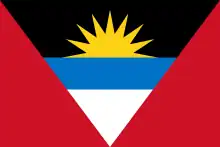 Antigua and Barbuda
Antigua and Barbuda Argentina
Argentina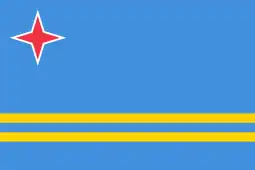 Aruba
Aruba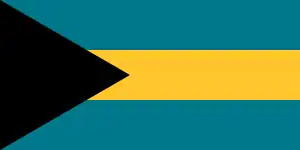 Bahamas
Bahamas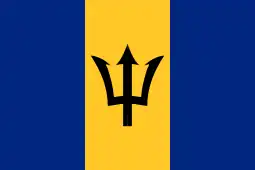 Barbados
Barbados.svg.png.webp) Belize
Belize.svg.png.webp) Bermuda
Bermuda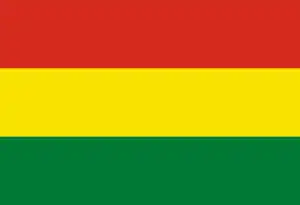 Bolivia
Bolivia Brazil
Brazil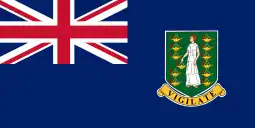 British Virgin Islands
British Virgin Islands.svg.png.webp) Canada (618)[15]
Canada (618)[15].svg.png.webp) Cayman Islands
Cayman Islands Chile
Chile Colombia
Colombia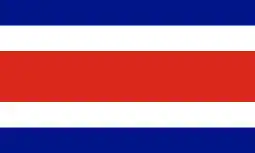 Costa Rica
Costa Rica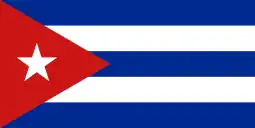 Cuba
Cuba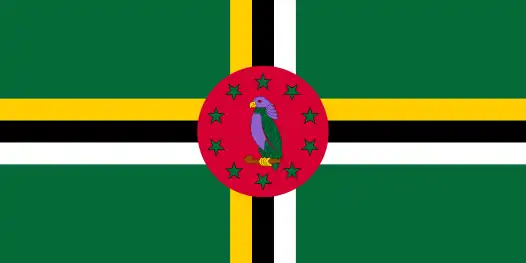 Dominica
Dominica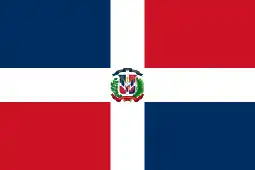 Dominican Republic
Dominican Republic.svg.png.webp) Ecuador
Ecuador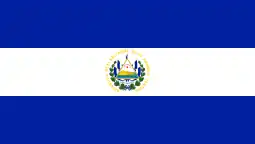 El Salvador
El Salvador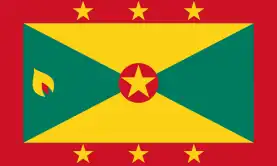 Grenada
Grenada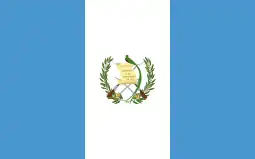 Guatemala
Guatemala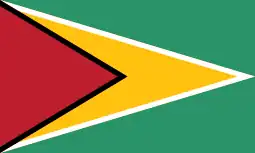 Guyana
Guyana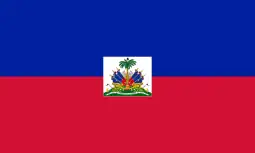 Haiti
Haiti.svg.png.webp) Honduras
Honduras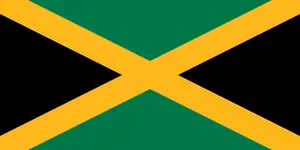 Jamaica
Jamaica Mexico
Mexico.svg.png.webp) Netherlands Antilles
Netherlands Antilles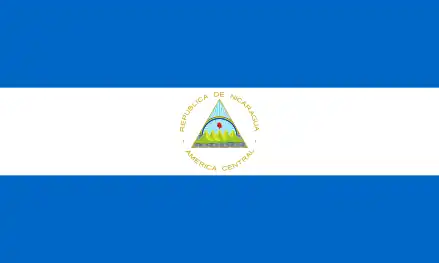 Nicaragua
Nicaragua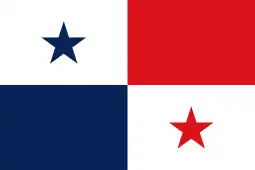 Panama
Panama.svg.png.webp) Paraguay
Paraguay Peru
Peru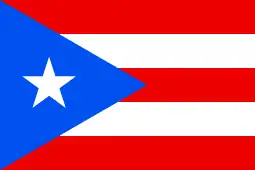 Puerto Rico
Puerto Rico.svg.png.webp) Saint Lucia
Saint Lucia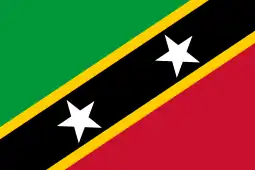 Saint Kitts and Nevis (1)[15]
Saint Kitts and Nevis (1)[15]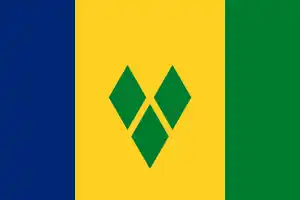 Saint Vincent and the Grenadines
Saint Vincent and the Grenadines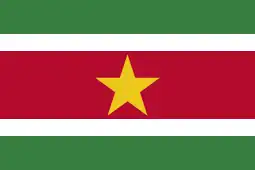 Suriname
Suriname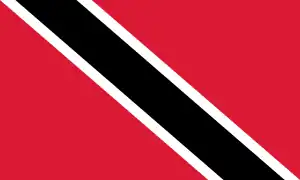 Trinidad and Tobago
Trinidad and Tobago United States (704)[19]
United States (704)[19]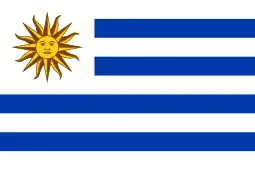 Uruguay
Uruguay.png.webp) Venezuela
Venezuela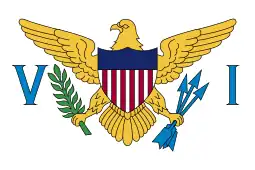 Virgin Islands
Virgin Islands
Sports
330 events in 34 sports were contested. Beach volleyball and inline hockey made its Pan American Games debut.[20] While a women's tournament in football (soccer) and water polo were contested for the first time.[21][22][23]
Numbers in parentheses indicate the number of medal events contested in each sport.
- Aquatics
 Diving (4) ()
Diving (4) () Swimming (32) ()
Swimming (32) () Synchronized swimming (2) ()
Synchronized swimming (2) () Water polo (2) ()
Water polo (2) ()
 Archery (4) ()
Archery (4) () Athletics (47) ()
Athletics (47) () Badminton (5) ()
Badminton (5) () Baseball (1) ()
Baseball (1) () Basketball (2) ()
Basketball (2) () Bowling (4) ()
Bowling (4) () Boxing (12) ()
Boxing (12) ()_pictogram.svg.png.webp) Canoeing (12) ()
Canoeing (12) ()- Cycling ()
_pictogram.svg.png.webp) Mountain biking (2)
Mountain biking (2)_pictogram.svg.png.webp) Road (4)
Road (4)_pictogram.svg.png.webp) Track (12)
Track (12)
 Equestrian (6) ()
Equestrian (6) () Fencing (10) ()
Fencing (10) () Field hockey (2) ()
Field hockey (2) ()- Gymnastics ()
 Handball (2) ()
Handball (2) () Judo (14) ()
Judo (14) () Karate (11) ()
Karate (11) () Modern pentathlon (2) ()
Modern pentathlon (2) () Racquetball (4) ()
Racquetball (4) () Roller sports ()
Roller sports ()
 Artistic roller skating (4)
Artistic roller skating (4) Inline speed skating (9)
Inline speed skating (9) Inline hockey (1)
Inline hockey (1)
 Rowing (13) ()
Rowing (13) () Sailing (10) ()
Sailing (10) () Shooting (16) ()
Shooting (16) () Soccer (2) ()
Soccer (2) () Softball (2) ()
Softball (2) () Squash (4) ()
Squash (4) () Table tennis (4) ()
Table tennis (4) () Taekwondo (8) ()
Taekwondo (8) () Tennis (4) ()
Tennis (4) () Triathlon (2) ()
Triathlon (2) ()- Volleyball
_pictogram.svg.png.webp) Volleyball (2) ()
Volleyball (2) ()_pictogram.svg.png.webp) Beach volleyball (2) ()
Beach volleyball (2) ()
 Water skiing (6) ()
Water skiing (6) () Weightlifting (15) ()
Weightlifting (15) () Wrestling (16) ()
Wrestling (16) ()
World records set
- Weightlifting – 77 kilogram clean & jerk – 202.5 kilograms hoisted by Idalberto Aranda (Cuba)
Impact of positive drug tests
Perhaps the greatest drug scandal in the sport of track and field, since Ben Johnson's 1988 disqualification, occurred here when the world's only eight foot high jumper Javier Sotomayor tested positive for cocaine. A Cuban national hero, his subsequent suspension was fought from the highest levels, Fidel Castro claiming it was a conspiracy. Despite a second positive test for cocaine a few months later, Sotomayor eventually had his suspension reduced by a year,[24] just in time to win a silver medal at the Sydney Olympics. A year later he retired facing another positive drug test.[25]
Canada was stripped of its gold medal for inline hockey when the team's goaltender Steve Vézina tested positive for multiple banned substances.[1]
Medal count
| 1 | Host nation |
To sort this table by nation, total medal count, or any other column, click on the ![]() icon next to the column title.
icon next to the column title.
| Rank | Nation | Gold | Silver | Bronze | Total |
|---|---|---|---|---|---|
| 1 | 106 | 119/110 | 79/80 | 304/296 | |
| 2 | 70/69 | 40/39 | 47 | 157/155 | |
| 3 | 64 | 52 | 80 | 196 | |
| 4 | 25 | 32 | 44 | 101 | |
| 5 | 25 | 19 | 28 | 72 |
- Note
^ The medal counts for the United States and Cuba are disputed.
Marketing
Legacy
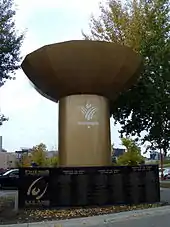
The 1999 Pan Am games have been "seen by many Winnipeggers as a chance to put their city squarely in the international spotlight".[27] Winnipeg mayor Glen Murray became nationally well known as a result of the Games and thanks to extensive coverage by the CBC, anchored by CBC Sports' Brian Williams. However, the Games themselves only had mixed success, as the Pan Am Games ranked below the Olympics and Commonwealth Games in international prestige. The Games cost $129 million CDN and finished with a financial surplus of $8.8 million CDN.
Hosts Canada celebrated its medal haul, which was the second best after the United States. However, some considered Canada's results overrated, since the U.S. amassed the most medals with a mostly second-string team while Canada and Cuba had fielded their top national athletes. Cuba also managed more golds than Canada, despite having a smaller roster.[27]
Frequent comparisons were made to the 1967 Pan Am Games, also hosted by Winnipeg, where the United States had fielded many rising stars, such as Mark Spitz. By comparison, the Americans had sent their "B" team to the 1999 Games. No major U.S. networks covered the Pan Am Games, except for the Spanish-language network Univisión, while newspapers only sent second-string reporters instead and the stories never made front page news.[27] Many high-profile athletes, of all nationalities, such as U.S. champion sprinters and Brazilian football players, were in Europe during these Pan Am games, taking part in professional events. South American nations (with the exception of Uruguay) did not send their under-23 male soccer teams after the organizing committee refused to pay appearance money to CONMEBOL.[28]
1999 Parapan American Games, Mexico City
In 1999, Parapan American Games was not hosted in Winnipeg but rather in Mexico City. The inaugural event involved 1,000 athletes from 18 countries competing in four sports.
References
- "'Best ever' Pan Am Games end". CBC News. August 9, 1999. Archived from the original on May 10, 2008. Retrieved July 27, 2009.
-
Dakshana Bascaramurty (July 3, 2015). "Glamour, pride and cash: Why cities compete to put on a sports spectacle". The Globe and Mail. Archived from the original on July 21, 2015. Retrieved July 16, 2015.
Winnipeg – the only other Canadian city ever to be a Pan Am host, which it has done twice – had a modest goal as well as a modest budget.
- "Pan Am surplus higher than expected". CharityVillage Ltd. April 24, 2000. Archived from the original on November 16, 2010. Retrieved January 8, 2012.
- "Gambling on the Games". Turner Sports Digital Services, Inc. August 7, 1999. Retrieved January 8, 2012.
- Brad Ohlman (May 10, 2000). "Canadian Olympic Association 1999 Annual Report" (PDF). Canadian Olympic Association. Archived from the original (PDF) on February 24, 2012. Retrieved January 8, 2012.
- "Winnipeg ready to host 1999 Pan Am Games". www.cbc.ca/. Canadian Broadcasting Corporation (CBC). July 3, 1999. Retrieved August 5, 2017.
- Kidd, Bruce; Torres, Cesar (April 19, 2018). Historicizing the Pan-American Games. Routledge. pp. 218–222. ISBN 978-1-138-21983-0.
- 1999 Pan Am Games "Winnipeg Bid - Step 1: Toronto" (mp4) (Television production). Toronto, Canada: In House Strategies Inc. 2016. Retrieved January 25, 2019.
- "Toronto wins bid to host 2015 Pan Am Games". CP24. Toronto, Ontario, Canada. The Canadian Press. November 6, 2009. Retrieved February 14, 2015.
- "El Sueno: Panamericanos-99" [The Dream: Pan American Games 1999]. El Tiempo (in Spanish). July 31, 1994. Retrieved January 25, 2019.
- Taylor, Scott (August 2, 1994). "We've got the Games!". Winnipeg Free Press. Winnipeg, Manitoba, Canada. Retrieved January 25, 2019.
- Bergman, Brian (July 26, 1999). "A fanfare for the Pan-Ams". Maclean's. Toronto, Ontario, Canada. Retrieved July 14, 2020.
- Gibson, Shane (July 23, 2019). "'The city was on a high': 1999 Pan Am Games held in Winnipeg 20 years ago". Global News. Toronto, Ontario, Canada. Retrieved July 14, 2020.
- "1999 Pan Am Games News – Legacies". University of Manitoba. Retrieved January 8, 2012.
- Morris, Jim (July 24, 2020). "Pan American Games open in Winnipeg". Canadian Press. Toronto, Ontario, Canada. Archived from the original on March 3, 2000. Retrieved July 15, 2020.
- Schoffner, Chuck (July 24, 1999). "Pan Am Games Under Way". Associated Press. New York City, New York, United States. Archived from the original on July 16, 2020. Retrieved July 15, 2020.
- Colbourn, Glen (July 22, 2020). "Singers, athletes get ready for opening of Pan Am Games". Canadian Press. Toronto, Ontario, Canada. Archived from the original on October 19, 2001. Retrieved July 15, 2020.
- "Pan Am games open in Winnipeg". cbc.ca.
- Scoggins, Chip (July 24, 1999). "Flag Bearer `crushed' by Selection". Chicago Tribune. Chicago, United States. Retrieved July 16, 2020.
- Vidal, Shannah-Lee (February 9, 2019). "Winter got you down? Winnipeg has plenty of fun, indoor activities to beat the cold". CBC News. Winnipeg, Manitoba, Canada. Retrieved July 18, 2020.
- "Canadian women's water polo team nominated for Toronto 2015 Pan Am Games". www.waterpolo.ca/. Water Polo Canada. May 28, 2015. Retrieved July 18, 2020.
Canada has won medals in women's water polo at every edition of the Pan Am Games since capturing gold in the event's debut at Winnipeg 1999.
- "Competing in Winnipeg, thinking Sydney". Sioux City Journal. Sioux City, Iowa, US. July 18, 1999. Retrieved July 18, 2020.
- "Canadians Highly Rates". Winnipeg Sun. Winnipeg, Manitoba, Canada. May 22, 1999. p. 49. Retrieved October 1, 2022.
- cocaine, Owen Slot reveals how the IAAF let Javier Sotomayor off the hook despite a second positive test for (August 12, 2000). "Athletics: New twist to Cuban drugs scandal". Retrieved April 2, 2018 – via www.telegraph.co.uk.
- Mackay, Duncan (November 26, 2001). "Javier Sotomayor faces drug ban". the Guardian. Retrieved April 2, 2018.
- Games, Quadro de Medalhas - English - Pan American. "XIII PAN AMERICAN GAMES WINNIPEG 1999 - MEDALS TABLE PAN AM 1999 - Pan American Games - Winnipeg Canada 1999". www.quadrodemedalhas.com. Retrieved April 2, 2018.
- Bergman, Brian. "Pan Am Games Wrap Up". The Canadian Encyclopedia. Retrieved August 21, 2019.
- "Any takers for the Pan Am Games? Winnipeg? Anybody?". torontosun.com. October 1, 2013. Retrieved April 2, 2018.
External links
- Winnipeg 1999 - XIII Pan American Games - Official Report (Part 1) at PanamSports.org
- Winnipeg 1999 - XIII Pan American Games - Official Report (Part 2) at PanamSports.org
